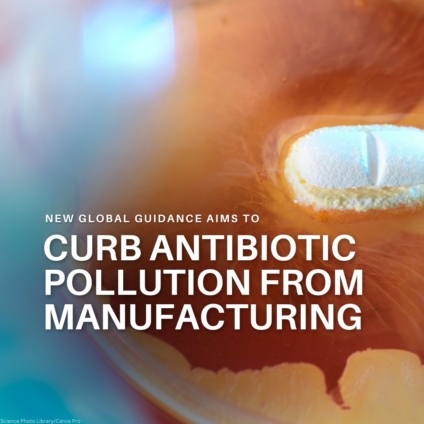The first-ever guidance on wastewater and solid waste management for antibiotic manufacturing has been published ahead of the United Nations General Assembly (UNGA) High-Level Meeting on antimicrobial resistance (AMR) taking place on 26 September 2024.
The World Health Organisation (WHO) warns that antibiotic pollution could lead to the spread of AMR, threatening the effectiveness of antibiotics worldwide, including those produced at the polluting manufacturing sites.
"Despite high antibiotic pollution levels being widely documented, the issue is largely unregulated and quality assurance criteria typically do not address environmental emissions," WHO said.
Lack of available information to consumers on how to dispose of antibiotics when they are not used, when they expire or when a course is finished are becoming concerns to health authorities.
“Pharmaceutical waste from antibiotic manufacturing can facilitate the emergence of new drug-resistant bacteria, which can spread globally and threaten our health," said Dr Yukiko Nakatani, WHO Assistant Director-General for AMR ad interim.
Dr. Nakatani emphasized that reducing pollution from antibiotic manufacturing is crucial to preserving the effectiveness of these vital medicines for global use.
WHO noted that worldwide, there is a significant gap in available information regarding the environmental impact of pharmaceutical manufacturing, making it difficult to assess and address the issue.
Director of the Department of Environment, Climate Change and Health at WHO, Dr. Maria Neira, explained that the new guidance offers a scientifically-grounded, neutral framework for regulators, purchasers, inspectors, and the industry to establish and enforce strict controls on antibiotic pollution.
“Critically, the strong focus on transparency will equip buyers, investors and the general public to make decisions that account for manufacturers’ efforts to control antibiotic pollution.” said Dr Neira.
The WHO guidance has been eagerly awaited by various international organizations, including the WHO Executive Board, G7 health ministers, and UNEP.
According to the Chief of Branch for the Industry and Economy Division at UNEP, Jacqueline Alvarez, it's crucial to carefully examine the environment's role in the development, transmission, and spread of antimicrobial resistance, as evidence on the issue continues to grow.
"There is a widespread agreement that action on the environment must become more prominent as a solution. This includes pollution prevention and control from municipal systems, manufacturing sites, healthcare facilities and agri-food systems."
The WHO guidance was created through a collaborative effort with a diverse group of global experts from various fields, including academia, regulation, inspection, international organizations like UNEP, and other sectors.
The draft was open to public feedback, receiving valuable insights from industry stakeholders and others.
The industry has also taken proactive steps through a voluntary initiative, which can be refined in certain areas to align with the new guidance.
The guidance sets targets to minimize the risk of AMR emergence and spread, protecting both human health and aquatic life from antibiotic contamination. It encompasses the entire production process, from active pharmaceutical ingredients (API) manufacturing to finished products and packaging.
AMR occurs when microbes become resistant to medicines, leading to harder-to-treat infections, increased illness, and death. While AMR is largely fueled by antimicrobial misuse and overuse, many people globally lack access to essential antimicrobial medicines, highlighting the need for responsible management.
Latest Stories
-
Biden commutes most federal death sentences
21 minutes -
Hollywood stars support Blake Lively over legal complaint
24 minutes -
GMeT warns commuters of intensified harmattan conditions
35 minutes -
Honda and Nissan join forces to take on China in cars
36 minutes -
CETAG threatens indefinite strike over breach of agreements
1 hour -
Fifty 50 Club lauded for impactful social interventions
1 hour -
Konongo and its environs risk water shortage as Owerri River ‘stops flowing’
1 hour -
Dr. Stacy Amewoyi launches new books and expands philanthropic efforts across Ghana and US
1 hour -
Hindsight: Legon Cities’ five years of fugazi money
2 hours -
JoyNews’ Kwasi Debrah ties knot with Dr. Neta Pasram in beautiful ceremony
2 hours -
Wimbledon winner Purcell admits anti-doping breach
2 hours -
Political party influence undermines leadership independence, says Prince Kofi Amoabeng
2 hours -
CHASS advises against reopening schools on Jan. 3 until financial arrears are cleared
2 hours -
Newmont’s Akyem Vocational Institute unveils battery-powered fufu machine at graduation ceremony
2 hours -
Newmont reinforces cultural heritage commitment in host communities
2 hours

